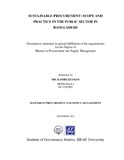Sustainable procurement: scope and practice in the public sector in Bangladesh

View/Open
Date
2012-12Publisher
BRAC UniversityAuthor
Kamruzzaman, Md.Metadata
Show full item recordAbstract
Sustainable procurement (SP) is procurement that is consistent with the principles of
sustainable development, such as ensuring a strong, healthy and just society, living
within environmental limits, and promoting good governance. Sustainable
procurement is an approach that takes economic, environmental and social
sustainability into account when making any purchasing decisions.
Public procurement is concerned with how public sector organizations spend tax
payers’ money on goods, works and services. Public procurement is guided by
principles of transparency, accountability, and achieving value for money for citizens
and tax payers. An analysis through the review of public procurement documents to find out the possible scope of sustainable procurement in present public procurement framework reveals that although there are some provisions in the PPR, 2008 and STDs which relate to the sustainability issues, these are not sufficient in introducing sustainability in the public procurement. The current scenario of sustainable procurement practice in the public sector has been studied through interviews with key procurement professionals from a number of public sector organizations addressing three aspects namely economic, environmental and social aspect of sustainable procurement. The analyses indicate that although there are a few cases where some sustainability issues are in practice, these are not very common as a whole in the public sector. Existing tendering system in Bangladesh is still based on the lowest price approach and whole life costing approach is rarely considered in various public sector
organizations. Majority of the public sector organizations do not have any provision
as such an environmental management system with the exception of a few. The study
indicates that at present there is virtually no mechanism in our public procurement
system to check the environmental performance of contractors/ suppliers.
public procurement ensures equal opportunity to all. The Public Procurement Rules,
2008 does not allow making specifications which may exclude some of the suppliers/
contractors. Ethical labour practice is present, although not to a great extent, in the
procurement system. Female labour participation is not adequately ensured though the
contract terms, although contractors sometimes engage female labour force for their
own interest.
Sustainability criteria should be embedded in the tendering system. Knowledge and
awareness at the individual procurement professional level seem important in order to
make active sustainable procurement choices. A clear commitment is necessary from
the very top of government and down through the ministries, authorities and chief
executives in all public bodies. It is necessary to formulate a sustainable procurement
policy and to align the public procurement framework with the policy. Political
willingness is required at the initial stage for such a policy.
The government needs to come forward to remove the barriers to sustainable
procurement – whether actual or perceived. Awareness campaign should be arranged
focusing on how to take account of non-monetary benefits of sustainable
procurement. Finally, there is scope to further study about the sustainability issue.
Advanced research needs to be conducted in order to get a deeper insight into the
sustainability issue in relation to the public procurement.
